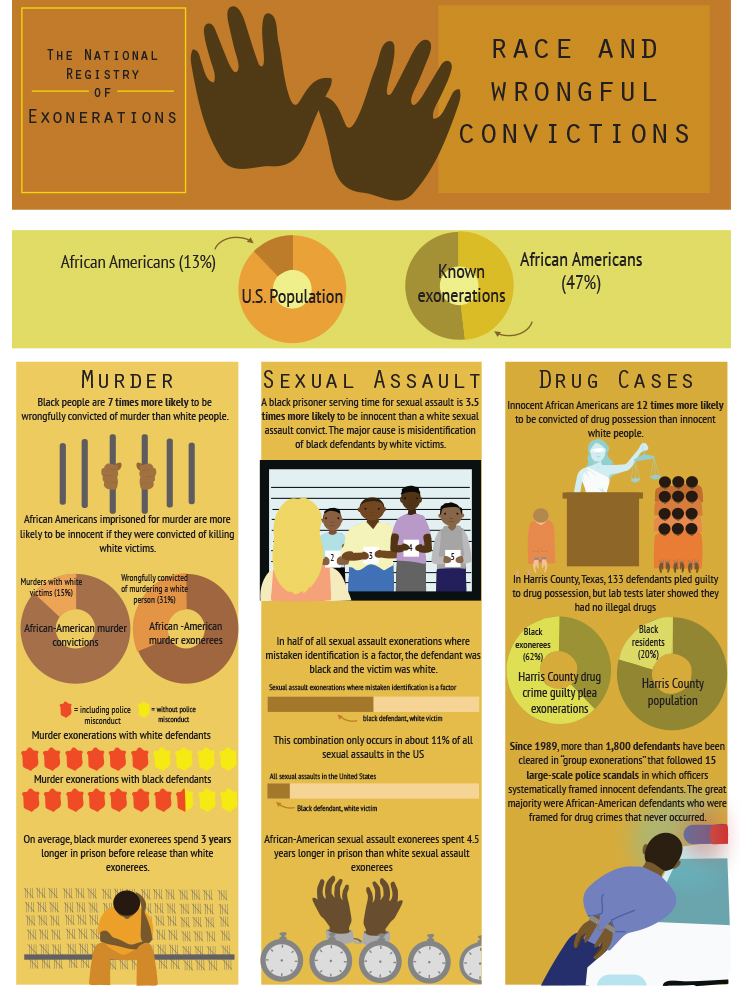What is wrongful conviction?
A wrongful conviction is a conviction of a person accused of a crime which, in the result of subsequent investigation, proves erroneous. (duhaime)nPersons who are in fact innocent but who have been wrongly convicted by a jury or other court of law. The U.S., which leads the world in incarceration of its citizens, has approximately 2 million people behind bars. That means a wrongful conviction rate of 1% would translate to 20,000 people punished for crimes they didn’t commit. On death row, 1 in 25 are likely innocent, according to a recent study.
Does Race play a role?
Yes, Many of the consequences of how race affects the larger criminal justice system can be seen in innocence-related efforts. An analysis of the 297 DNA exonerations reveals minorities make up approximately 70% of those proven innocent through DNA testing. Similarly, African-Americans represent the vast majority of these exonerations – 63% of those exonerated by DNA testing.
In total, nearly 75% of the DNA exoneration cases involve an eyewitness misidentification – approximately 42% of which are cross-racial misidentifications. Research studies have shown how victims or witnesses can have difficulty identifying facial characteristics of a dissimilar race.Many of the consequences of how race affects the larger criminal justice system can be seen in innocence-related efforts.
Because minorities are more likely to be arrested as juveniles, false confessions are more likely to occur. Juveniles are especially vulnerable to giving false confessions because they’re easier to manipulate. Many African-American and Hispanic exonerated men who were arrested as juveniles in urban communities were coerced into give incriminating statements that significantly differed from the crime scene evidence. (The Innocence project)
A perfect example of a wrongful conviction can be seen in 1997 in Tucson Arizona. Rafael Suarez was convicted of a vicious felony assault for which another man had already pleaded guilty. Suarez’s lawyer interviewed the woman who called 911 to report the incident as well as a second eyewitness. Both said that Suarez did not attack the victim and, in fact, had attempted to stop the assault. A third witness told the lawyer that he heard the victim say that he would lie in court to get Suarez convicted. None of these witnesses were called to testify at trial. Suarez was convicted and sentenced to five years. (washington post)
After these facts came to light in 2000, Suarez was released. He had lost his house and his job, and his plan to become a paralegal had been derailed. His wife had divorced him, and he had lost parental rights to their three children, including one born while he was locked up. Suarez sued his former lawyer, who by then had been disbarred. He got a $1 million judgment, but the lawyer had no assets and filed for bankruptcy. Barring a miracle, Suarez will never see a penny of that judgment.The most depressing thing about Suarez’s case is how lucky he was. He was exonerated, against all odds, because his otherwise irresponsible lawyer had actually talked to the critical witnesses and recorded those interviews despite failing later to call them at trial.
My interest in this topic first came up after I found numerous documentaries on the subjuct on Netflix. I found it shocking how a person couls spend so much time in prison on a crime that so many people know they did not commit. I think the most disheartening this about false imprisonment is that our system is so quick to convict, but that it takes literal years for a person to actually get out (if they even get out at all). Upon doing my research for this post I found lawyers would cite again and again that a false conviction is their worst nightmare, if thats the case, I wonder why we arent doing more as a country to review cases of those who are appealing their convictions.
https://www.washingtonpost.com/opinions/the-cost-of-convicting-the-innocent/2015/07/24/260fc3a2-1aae-11e5-93b7-5eddc056ad8a_story.html?utm_term=.8e0839851fc9


This topic was interesting to read. It truly is amazing and disturbing that wrongful convictions still occur to this day. We should be past this point in our criminal justice system. There should be a better process to review these cases to ensure this comes to an end because it ruins peoples lives.
Wrongful convictions are a serious problem and can cause irrefutable damage to peoples lives.We need to remember that in the criminal justice system , a person is “innocent until proven guilty.” However, it oftentimes appears to be the other way around.
You raised up a very serious problem happening in the nation. Wrongful convictions can not only inflict a huge damage on the wrongfully convicted people but also allow the real perpetrator(s) to live as nothing has happened and may lead them to commit crimes again. Besides, you also highlighted the role of discrimination on the minorities playing in this case, which I strongly believe it’s worth to look at since they form the major group of th wrongful convicted.
Wrongful conviction can cause a tremendous harm to the victims both mentally and physically. The criminal justice system needs to make full use of the DNA technology and other reliable technical sources to reduce the chance of wrongful conviction as much as possible.